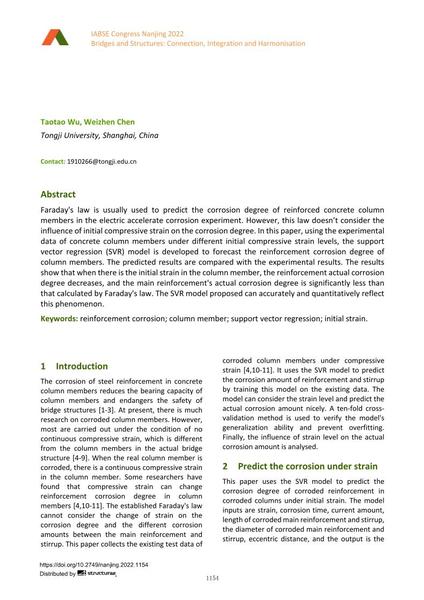Prediction of Concrete Column Reinforcement Corrosion Degree Under Initial Strain Based on Support Vector Regression

|
|
|||||||||||
Détails bibliographiques
| Auteur(s): |
Taotao Wu
(Tongji University, Shanghai, China)
Weizhen Chen (Tongji University, Shanghai, China) |
||||
|---|---|---|---|---|---|
| Médium: | papier de conférence | ||||
| Langue(s): | anglais | ||||
| Conférence: | IABSE Congress: Bridges and Structures: Connection, Integration and Harmonisation, Nanjing, People's Republic of China, 21-23 September 2022 | ||||
| Publié dans: | IABSE Congress Nanjing 2022 | ||||
|
|||||
| Page(s): | 1154-1160 | ||||
| Nombre total de pages (du PDF): | 7 | ||||
| DOI: | 10.2749/nanjing.2022.1154 | ||||
| Abstrait: |
Faraday's law is usually used to predict the corrosion degree of reinforced concrete column members in the electric accelerate corrosion experiment. However, this law doesn’t consider the influence of initial compressive strain on the corrosion degree. In this paper, using the experimental data of concrete column members under different initial compressive strain levels, the support vector regression (SVR) model is developed to forecast the reinforcement corrosion degree of column members. The predicted results are compared with the experimental results. The results show that when there is the initial strain in the column member, the reinforcement actual corrosion degree decreases, and the main reinforcement's actual corrosion degree is significantly less than that calculated by Faraday's law. The SVR model proposed can accurately and quantitatively reflect this phenomenon. |
||||
| Copyright: | © 2022 International Association for Bridge and Structural Engineering (IABSE) | ||||
| License: | Cette oeuvre ne peut être utilisée sans la permission de l'auteur ou détenteur des droits. |
||||
